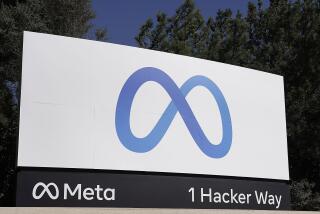EU accuses Microsoft of overcharging rivals
BRUSSELS — The European Union escalated its trans-Atlantic fight with Microsoft Corp. on Thursday, threatening multimillion-dollar fines against the software maker over claims it was asking rivals to pay too much for information that would help their products work with Windows.
In response, Microsoft charged that the treatment it received from the EU was unprecedented and harmed Europe’s efforts to become a thriving high-tech economy.
The EU said the software maker could face daily fines of as much as 3 million euros ($4 million) and accused Microsoft of protecting its own interests by setting unreasonable prices for the “complete and accurate” documentation that competitors would need to build products compatible with Windows PCs and servers.
In a so-called “statement of objections” released Thursday, the EU’s executive commission rejected 1,500 pages of documents Microsoft had submitted to back up its pricing.
“I am therefore again obliged to take formal measures to ensure that Microsoft complies with its obligations,” EU Antitrust Commissioner Neelie Kroes said.
Microsoft General Counsel Brad Smith responded that the company had asked for feedback on its pricing proposals and documentation half a year ago, and only Thursday received a reply accompanied by a threat.
“We’re disappointed that this feedback is coming six months later and in its present form,” Smith said. “You cannot reach an agreement if you are just talking to yourself.”
He added that “the findings appear to be an attempt to regulate the pricing of our intellectual property rights on a global basis,” something that would go beyond the jurisdiction of the EU.
This is not the first time EU regulators threatened fines to push Redmond, Wash.-based Microsoft to comply with its 2004 antitrust ruling, in which it found the company broke competition laws and abused its dominant market position.
Besides the record 497-million-euro fine it imposed at the time of the ruling, the EU levied a 280.5-million-euro fine last summer, saying Microsoft did not supply complete interoperability documentation.
Microsoft has reached licensing agreements with several of the companies that took issue with the software maker’s pricing, including Sun Microsystems Inc. and Novell Inc.
But the company still faces pressure in Europe from open-source software companies that want to use its technology.
The company has four weeks to reply to the commission’s preliminary finding.






